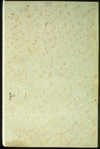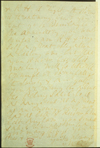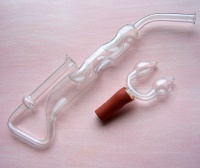Mahatma Letter No. 24: Difference between revisions
No edit summary |
Pablo Sender (talk | contribs) |
||
| (4 intermediate revisions by one other user not shown) | |||
| Line 1: | Line 1: | ||
{{Infobox MLbox | {{Infobox MLbox | ||
| header1 = People involved | | | header1 = People involved | | ||
| Line 9: | Line 7: | ||
| writtendate = unknown | | writtendate = unknown | ||
| receiveddate = October 1881 See [[Mahatma Letter No. 24#Context and background|below]]. | | receiveddate = October 1881 See [[Mahatma Letter No. 24#Context and background|below]]. | ||
| otherdate = | | otherdate = unknown | ||
| header3 = Places | | header3 = Places | ||
| sentfrom = unknown | | sentfrom = unknown | ||
| receivedat = [[Simla, India]] | | receivedat = [[Simla, India]] | ||
| vialocation = | | vialocation = unknown{{pad|9em}} | ||
}} | }} | ||
''' | This is '''Letter No. 24''' in '''[[The Mahatma Letters to A. P. Sinnett (book)|''The Mahatma Letters to A. P. Sinnett'']], 4th chronological edition'''. It corresponds to '''Letter No. 71''' in '''Barker numbering.''' See below for [[Mahatma Letter No. 24#Context and background|Context and background]]. | ||
<br> | <br> | ||
<br> | <br> | ||
| Line 78: | Line 76: | ||
== Commentary about this letter == | == Commentary about this letter == | ||
[[File:Nose pipe.jpg|200px|right|thumb|Water pipe with nasal adapter.]] | [[File:Nose pipe.jpg|200px|right|thumb|Water pipe with nasal adapter.]] | ||
The reference to the "tobacco machine" | The reference to the "tobacco machine" that "has to be coolated" is unclear. | ||
Anton Diachenko has suggested that the pipe involved might not be a Western-style pipe, but a variation of water pipe. Morya was reported by [[Helena Petrovna Blavatsky|HPB]] to have been a habitual user of a water pipe or hookah. The substance that Morya used to produce vapor is unknown. Mr. Diachenko suggests that it may have been something related to Ozone, a "substance with high enough negative Redox Potential". This speculation may be based on a quote in [[The Secret Doctrine (book)|''The Secret Doctrine'']] that says: | Anton Diachenko has suggested that the pipe involved might not be a Western-style pipe, but a variation of water pipe. Morya was reported by [[Helena Petrovna Blavatsky|HPB]] to have been a habitual user of a water pipe or hookah. The substance that Morya used to produce vapor is unknown. Mr. Diachenko suggests that it may have been something related to Ozone, a "substance with high enough negative Redox Potential". This speculation may be based on a quote in [[The Secret Doctrine (book)|''The Secret Doctrine'']] that says: | ||
| Line 88: | Line 86: | ||
== Notes == | == Notes == | ||
<references/> | <references/> | ||
[[Category:ML from Morya]] | |||
[[Category:ML to A. P. Sinnett]] | |||
[[Category:ML with images]] | |||
[[es:Carta de los Mahatmas No. 24]] | [[es:Carta de los Mahatmas No. 24]] | ||
[[it:Lettera dei Mahatma n° 71]] | [[it:Lettera dei Mahatma n° 71]] | ||
Latest revision as of 17:18, 9 May 2022
| Quick Facts | |
|---|---|
| People involved | |
| Written by: | Morya |
| Received by: | A. P. Sinnett |
| Sent via: | unknown |
| Dates | |
| Written on: | unknown |
| Received on: | October 1881 See below. |
| Other dates: | unknown |
| Places | |
| Sent from: | unknown |
| Received at: | Simla, India |
| Via: | unknown |
This is Letter No. 24 in The Mahatma Letters to A. P. Sinnett, 4th chronological edition. It corresponds to Letter No. 71 in Barker numbering. See below for Context and background.
< Prev letter chrono
Next letter chrono >
< Prev letter Barker
Next letter Barker >
Page 1 transcription, image, and notes
|
Very kind Sinnett Sahib — many thanks and salams for the tobacco-machine. Our frenchified and pelingized Pandit tells me the little short thing has to be cooloted — whatever he may mean by this — and so I will proceed to do so. The pipe is short and my nose long, so we will agree very well toge[ther] I hope. Thanks — many thanks. The situation is more serious than you may imagine and we will want our best forces and hands to work at pushing away bad luck. But our Chohan willing and you helping we will scramble out somehow or another. There are clouds which are below your horizon |
NOTES:
|
Page 2
|
and K.H. is right — the storm is threatening. Could you but go to Bombay to the Anniversary you would confer upon K.H. and myself a great obligation a lasting one — but that you know best. This meeting will be either the triumph or the downfall of the Society and a — gulf. You are wrong too about the Peling Sahib — he is as dangerous as a friend as an enemy very very bad as both I know him best. Anyhow you Sinnett Sahib reconciled me to a good many things you are true and true I will be. Yours always M. |
NOTES:
|
Context and background
Hanson and Linton wrote that "KH was preparing for his long retreat, and M was taking over his correspondence. This is the first letter received by APS from M."[1]
Physical description of letter
The original is in the British Library, Folio 3. According to George Linton and Virginia Hanson, the letter was written:
In pale sepia ink on a single sheet of vellum note paper. On the front of the sheet, the writing is diagonally on the page, and on the back, it is square with the paper.[2]
Publication history
Commentary about this letter
The reference to the "tobacco machine" that "has to be coolated" is unclear.
Anton Diachenko has suggested that the pipe involved might not be a Western-style pipe, but a variation of water pipe. Morya was reported by HPB to have been a habitual user of a water pipe or hookah. The substance that Morya used to produce vapor is unknown. Mr. Diachenko suggests that it may have been something related to Ozone, a "substance with high enough negative Redox Potential". This speculation may be based on a quote in The Secret Doctrine that says:
He who would allotropise sluggish oxygen into Ozone to a measure of alchemical activity, reducing it to its pure essence (for which there are means), would discover thereby a substitute for an “Elixir of Life” and prepare it for practical use.[3]
He goes on to suggest that for these purposes this "smoking" had to be not through the mouth but through the nose, as the nasal passages could more readily assimilate prana. Thus, Morya's pipe could have been a water pipe with an adapter to permit inhalation through the nose (maybe this is the meaning of the remark "The pipe is short and my nose long, so we will agree very well together"). The shape of that adapter resembles dressing pants, which in French are called culottes, leading to the phrase "coolated".[4][5]
Notes
- ↑ George E. Linton and Virginia Hanson, eds., Readers Guide to The Mahatma Letters to A. P. Sinnett (Adyar, Chennai, India: Theosophical Publishing House, 1972), 73.
- ↑ George E. Linton and Virginia Hanson, eds., Readers Guide to The Mahatma Letters to A. P. Sinnett (Adyar, Chennai, India: Theosophical Publishing House, 1972), 73.
- ↑ Helena Petrovna Blavatsky, The Secret Doctrine vol. I, (Wheaton, IL: Theosophical Publishing House, 1993), 144, fn.
- ↑ George E. Linton and Virginia Hanson, eds., Readers Guide to The Mahatma Letters to A. P. Sinnett (Adyar, Chennai, India: Theosophical Publishing House, 1972), 73-74.
- ↑ Email from Anton Diachenko to Janet Kerschner. February 27, 2014.


